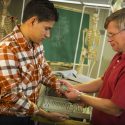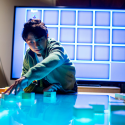Federal grants power research on computer games and learning
A research team at the University of Wisconsin–Madison recently won $4.5 million in federal grants to study computer games and learning.
“Funding at this scale gives us an unprecedented opportunity to use computer games to teach — and to test what kids have learned — in a new way,” says David Williamson Shaffer, a professor of educational psychology in the UW–Madison School of Education who is principal investigator on three of the four grants. “This funding lets us use the power of computer technology to prepare kids for the world of global competition that computer technology has created.”
The largest of the National Science Foundation grants — for $3.5 million — creates a research consortium of three universities to develop technology that will let computers teach real-world problem-solving.
The team will use the educational computer game “Urban Science,” which was developed at UW–Madison with previous funding from the National Science Foundation and the Macarthur Foundation.
In the game, middle- and high-school students learn about mathematics, science and technology by working as urban planners. Guided by adult mentors as part of a fictitious urban planning firm, they develop real plans for sustainable land use.
In partnership with the Massachusetts Audubon Society, students across Massachusetts will have an opportunity to play “Urban Science,” and the researchers will collect data on what the students and adult mentors do in the game.
The research team will use this data to create computer-generated, artificially intelligent characters in game to coach students, so ultimately the game will be easy for teachers and students to use as part of science classes or in after-school programs.
“But more important,” says Shaffer, “once we know how to create computer-generated mentors for this game, we can provide mentoring as part of any educational game.”
The research consortium has an additional $300,000 grant to develop an assessment system that will do a better job than existing standardized tests at showing whether students have learned to solve real-world problems like those they face in “Urban Science.”
“The problem with standardized tests,” says Shaffer, who is also a game scientist with the Wisconsin Center for Educational Research, “is that they test the wrong thing. They test whether students have learned basic facts and basic skills, and not whether they can solve real problems.”
Shaffer and his team are developing and validating an assessment system to provide instant feedback on students’ learning without using traditional standardized tests.
“Again,” says Shaffer, “if we can do it for this game, we can do it for any game — and we can do it any time we care more about solving complex problems rather than learning basic skills. This is a new way of thinking about assessment for a new century.”
Two more grants let Shaffer and his colleagues use the same techniques to improve undergraduate instruction at UW–Madison. Collaborating with associate professor Naomi Chessler in the College of Engineering, the team is developing computer games to make engineering a more diverse profession.
A $500,000 project will develop the computer game “Nephrotex,” which Shaffer and Chesler say has the potential to increase the number of women and minority students in engineering programs. In the game, players work as part of a fictitious engineering firm using nanotechnology to design a better dialysis machine.
“The game will give undergraduates an early look at the kind of work real engineers do,” says Chesler, a view of the profession that isn’t always clear as students plow through required math and science courses.
“Too often, students don’t get a chance to see the human side of engineering until they’ve gone through a lot of coursework,” says Shaffer. “Students get intimidated and drop out. If we can build a game that lets freshmen interested in engineering solve complex problems, they can get a better understanding of how the things they learn in their other classes make sense and fit together.”
The game is also funded, in part, by another $200,000 grant led by professor Wendy Crone in the College of Engineering to create a nanotechnology certificate program for engineering undergraduates.
Shaffer is quick to point out that projects on this scale are possible, partly because of the ongoing support UW–Madison has shown for research on computer games and learning. With faculty working in several departments across campus, “UW is one of the leaders in this field,” says Shaffer.
Tags: learning, research, School of Education


